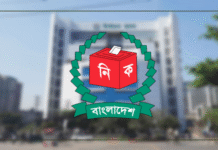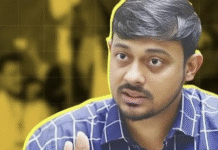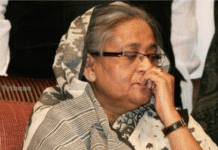The International Crimes Tribunal-1 on Thursday set May 20 for starting war crimes trial with the testimony of prosecution witnesses against a post-independence union-level Awami League leader.
The tribunal fixed the date after a brief opening statement by designated prosecutor Syed Haider Ali to try for the first time an Awami Leauger (expelled) Mobarak Hossain of Akhaura in Brahmanbaria, also a pre-independence Rokan (qualified member) of Jamaat-e-Islami.
On April 23, the tribunal indicted detained Mobarak Hossain, a commander of Razaker, a vigilante group of Pakistan occupation army in 1971, for committing the crimes against humanity during the Liberation War.
According to the prosecution, Mobarak had acted as Razaker commander at makeshift Shuhilpur camp in Brahmanbaria in 1971.
The tribunal considered five specific charges against Mubarak like murder, torture, looting, killing and abduction under the updated International Crimes (Tribunals) Act 1973 sans genocide as pressed by the prosecution.
A total of 21 people have been made prosecution witnesses in the case.
According to the designated investigator under the ICT, Mobarak had performed as organising secretary of union parishad unit of Awami League in Akhaura, Brahmanbaria for long 16 years.
Khodeja Begum, whose father was allegedly killed by Mobarak, filed a case with Brahmanbaria court in 2009 which was transferred to the International Crimes Tribunal in 2011.
The tribunal then asked the agency to investigate the matter.
Meanwhile, the tribunal fixed May 26 for hearing on cognisance of the offences made against Jamaat-e-Islami policymaker Mir Kashem Ali, now in custody, as the prosecution submitted to the office of the ICT registrar formal charges against him.
According to the prosecution, Mir Kashem Ali, the then Chittagong district head of Al Badr, had perpetrated crimes against humanity like killing, looting, abduction, persecution, genocide, rape and setting fire to the houses of unarmed civilians during the Liberation War in collaboration with Pakistan occupation army.
The war-crimes accused had also set up makeshift torture camps at different places in the port city where the freedom-loving people were handed down punishment.
Source: UNBConnect










